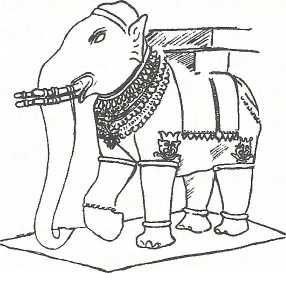Talk:Airāvata
By Swami Harshananda
Airāvata literally means ‘born out of water or ocean’.
Airāvata, The Mount of Indra[edit]
When the devas (gods) and asuras (demons) started churning the kṣīra-samudra[1] for getting amṛta,[2] several divine and mysterious objects emerged out of it. The majestic Airāvata,[3] the four-tusked white elephant, was the one. Indra, the chief of the devas chose it as his mount.
Airāvata, Son of Bhadramanasa[edit]
According to another version, Airāvata was the offspring of the elephant Bhadramanasa which Indra claimed as his mount. Indra, who is also the presiding god of the rain, pours rain while sitting on this elephant. Indra threw the sacred garland given by the sage Durvāsas on this elephant out of arrogance and pride. The airāvata in turn threw it under its feet and trampled it thus enraging the irascible sage who cursed Indra to lose his sovereignty.
Airāvata, Support of Earth[edit]
Airāvata is also the name of the elephant supporting the earth on its eastern quarter. It is one of the eight elephants known as aṣṭadig-gajas. It is believed to be supporting the quarters. It is sometimes described as the king of elephants and a prototype of all the elephants.[4]
Airāvata , Serpent King[edit]
‘Airāvata’ is also the name of a serpent king who is said to have protected Aśvasena, the son of Takṣaka.[5]
References[edit]
- The Concise Encyclopedia of Hinduism, Swami Harshananda, Ram Krishna Math, Bangalore

